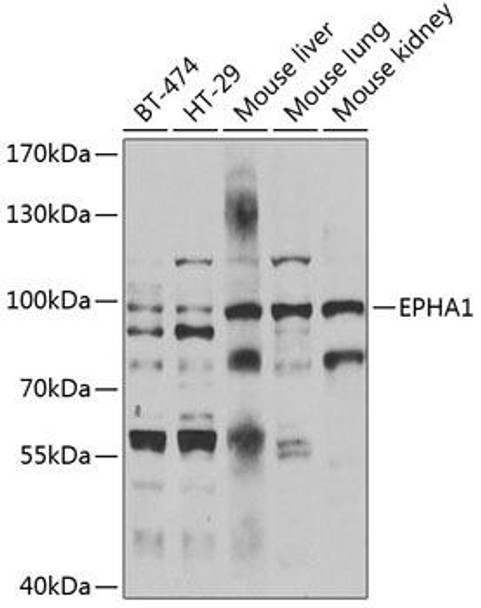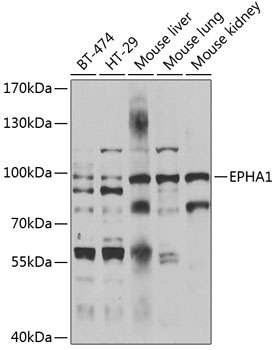Anti-EPHA1 Antibody (CAB7328)
- SKU:
- CAB7328
- Product type:
- Antibody
- Reactivity:
- Human
- Mouse
- Host Species:
- Rabbit
- Isotype:
- IgG
- Antibody Type:
- Polyclonal Antibody
- Research Area:
- Cardiovascular
Description
| Antibody Name: | Anti-EPHA1 Antibody |
| Antibody SKU: | CAB7328 |
| Antibody Size: | 20uL, 50uL, 100uL |
| Application: | WB |
| Reactivity: | Human, Mouse |
| Host Species: | Rabbit |
| Immunogen: | Recombinant fusion protein containing a sequence corresponding to amino acids 1-230 of human EPHA1 (NP_005223.4). |
| Application: | WB |
| Recommended Dilution: | WB 1:500 - 1:2000 |
| Reactivity: | Human, Mouse |
| Positive Samples: | BT-474, HT-29, Mouse liver, Mouse lung, Mouse kidney |
| Immunogen: | Recombinant fusion protein containing a sequence corresponding to amino acids 1-230 of human EPHA1 (NP_005223.4). |
| Purification Method: | Affinity purification |
| Storage Buffer: | Store at -20°C. Avoid freeze / thaw cycles. Buffer: PBS with 0.02% sodium azide, 50% glycerol, pH7.3. |
| Isotype: | IgG |
| Sequence: | MERR WPLG LGLV LLLC APLP PGAR AKEV TLMD TSKA QGEL GWLL DPPK DGWS EQQQ ILNG TPLY MYQD CPMQ GRRD TDHW LRSN WIYR GEEA SRVH VELQ FTVR DCKS FPGG AGPL GCKE TFNL LYME SDQD VGIQ LRRP LFQK VTTV AADQ SFTI RDLV SGSV KLNV ERCS LGRL TRRG LYLA FHNP GACV ALVS VRVF YQRC PETL NGLA QFPD TLPG PAGL VEVA GT |
| Gene ID: | 2041 |
| Uniprot: | P21709 |
| Cellular Location: | Cell membrane, Single-pass type I membrane protein |
| Calculated MW: | 51kDa/52kDa/108kDa |
| Observed MW: | 100kDa |
| Synonyms: | EPHA1, EPH, EPHT, EPHT1 |
| Background: | This gene belongs to the ephrin receptor subfamily of the protein-tyrosine kinase family. EPH and EPH-related receptors have been implicated in mediating developmental events, particularly in the nervous system. Receptors in the EPH subfamily typically have a single kinase domain and an extracellular region containing a Cys-rich domain and 2 fibronectin type III repeats. The ephrin receptors are divided into 2 groups based on the similarity of their extracellular domain sequences and their affinities for binding ephrin-A and ephrin-B ligands. This gene is expressed in some human cancer cell lines and has been implicated in carcinogenesis. |
| UniProt Protein Function: | EphA1: a receptor tyrosine kinase. Receptor for members of the ephrin-A family. Binds with a low affinity to ephrin-A1. The Eph receptor tyrosine kinase family, the largest in the tyrosine kinase group, has fourteen members. They bind membrane-anchored ligands, ephrins, at sites of cell-cell contact, regulating the repulsion and adhesion of cells that underlie the establishment, maintenance, and remodeling of patterns of cellular organization. Eph signals are particularly important in regulating cell adhesion and cell migration during development, axon guidance, homeostasis and disease. EphA receptors bind to GPI-anchored ephrin-A ligands, while EphB receptors bind to ephrin-B proteins that have a transmembrane and cytoplasmic domain. Interactions between EphB receptor kinases and ephrin-B proteins transduce signals bidirectionally, signaling to both interacting cell types. Eph receptors and ephrins also regulate the adhesion of endothelial cells and are required for the remodeling of blood vessels. Misexpressed in several cancers, including upregulation in head and neck cancer, and downregulation in invasive breast cancer cell lines and glioblastoma |
| UniProt Protein Details: | Protein type:Membrane protein, integral; EC 2.7.10.1; Protein kinase, tyrosine (receptor); Kinase, protein; Protein kinase, TK; TK group; Eph family Chromosomal Location of Human Ortholog: 7q34 Cellular Component: integral to plasma membrane; plasma membrane Molecular Function:ATP binding; protein kinase activity; protein kinase binding; transmembrane-ephrin receptor activity Biological Process: angiogenesis; cell surface receptor linked signal transduction; ephrin receptor signaling pathway; negative regulation of cell migration; negative regulation of protein kinase activity; peptidyl-tyrosine phosphorylation; positive regulation of angiogenesis; positive regulation of cell migration; positive regulation of cell proliferation; positive regulation of cell-matrix adhesion; positive regulation of stress fiber formation; protein amino acid autophosphorylation; regulation of GTPase activity; somatic stem cell maintenance |
| NCBI Summary: | This gene belongs to the ephrin receptor subfamily of the protein-tyrosine kinase family. EPH and EPH-related receptors have been implicated in mediating developmental events, particularly in the nervous system. Receptors in the EPH subfamily typically have a single kinase domain and an extracellular region containing a Cys-rich domain and 2 fibronectin type III repeats. The ephrin receptors are divided into 2 groups based on the similarity of their extracellular domain sequences and their affinities for binding ephrin-A and ephrin-B ligands. This gene is expressed in some human cancer cell lines and has been implicated in carcinogenesis. [provided by RefSeq, Jul 2008] |
| UniProt Code: | P21709 |
| NCBI GenInfo Identifier: | 317373566 |
| NCBI Gene ID: | 2041 |
| NCBI Accession: | P21709.4 |
| UniProt Secondary Accession: | P21709,Q15405, A1L3V3, B5A966, B5A967, |
| UniProt Related Accession: | P21709 |
| Molecular Weight: | 51,069 Da |
| NCBI Full Name: | Ephrin type-A receptor 1 |
| NCBI Synonym Full Names: | EPH receptor A1 |
| NCBI Official Symbol: | EPHA1 |
| NCBI Official Synonym Symbols: | EPH; EPHT; EPHT1 |
| NCBI Protein Information: | ephrin type-A receptor 1 |
| UniProt Protein Name: | Ephrin type-A receptor 1 |
| UniProt Synonym Protein Names: | EPH tyrosine kinase; EPH tyrosine kinase 1; Erythropoietin-producing hepatoma receptor; Tyrosine-protein kinase receptor EPH |
| Protein Family: | Ephrin type-A receptor |
| UniProt Gene Name: | EPHA1 |
| UniProt Entry Name: | EPHA1_HUMAN |






